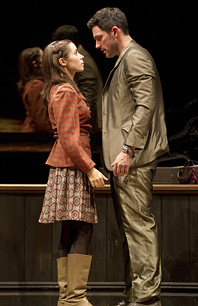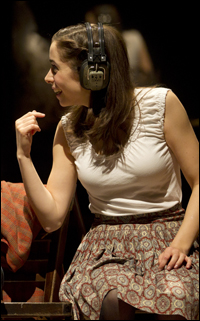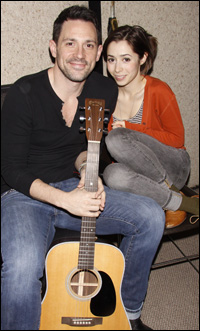
Cristin Milioti
For several years, Cristin Milioti, whose New York theatrical credits include Coram Boy, That Face, Stunning, The Heart Is a Lonely Hunter and The Lieutenant of Inishmore, has been trying to land a role in a Broadway musical, and that wish has finally been granted in one of the season's hottest tickets, the critically acclaimed Once, which is based on the Oscar-winning film of the same name about an Irish singer-songwriter named Guy (Steve Kazee), who meets a muse in the person of a Czech immigrant named Girl (Milioti). The musical at the Bernard B. Jacobs Theatre, featuring direction by John Tiffany and movement by Steven Hoggett, borrows the 2007 movie's songs by Glen Hansard and Markéta Irglová, who also played the would-be lovers in the film, with the addition of two other numbers. Last week, I had the pleasure of chatting with Milioti, who is offering a beautifully layered and touching performance in the new musical, which celebrates life, love and the power of music; that interview follows.
Question: How did Once come about for you originally?
Cristin Milioti: Well, I was asked to audition for it for when it was just going to be a two or three-day reading. This was about a year ago; this was last February. I auditioned for the role of the Girl, but I didn't know that it had actually already been cast before auditions. And so I played Réza, the girl flatmate, but John Tiffany and I hit it off right away in the audition. I did the three-day reading, and I had a great time with Steven Hogget and [music supervisor] Martin [Lowe]. Then I just figured I was done, and I would never see anyone ever again. [Laughs.] And, I went on my way. Two days later, my agent called me saying that John wanted me to audition for the role of the Girl, but there was concern over my piano ability because I can't sight-read. And, I've never been able to play a piece with each hand doing a different thing. I've been able to play basic chords. I played a Regina Spektor song for him when I auditioned, and it was real simple—her stuff isn't simple, but it was like C chord, G chord, D chord. So they gave me 10-12 days to learn two pieces—to learn "The Hill" and a classical piece of my choosing. And, it was a harrowing ten or 12 days! I just sat for seven hours a day, and my friend, Santino Fontana—who you may know—he's a trained pianist, and so he helped me. I have an incredible group of friends—they would watch me, so I could mess up in front of them, so I wouldn't be nervous when I went in. After ten or 12 days, I learned these two pieces and went in and played them, and that got me the job in Cambridge, which I sort of felt was like an extended audition process—it's a five-week workshop. And, after that they asked me to come to New York Theatre Workshop. It just evolved. Looking back on it, it was almost like every event leading up to it was very much kismet.
Question: How familiar with the movie were you before that first reading? And, did you go back to it?
Milioti: I've still never seen it. Question: Really?
Milioti: Yeah. No, I've never seen it. When they called me about the reading, I vaguely remembered there was a movie called "Once." What appealed to me was that I would be able to sing and play piano because I love doing that so much, and I've auditioned for musicals for years, and no one would have me. [Laughs.] I was really excited because I [thought], "Well, this sounds like it's something that I fit" because I don't think my voice necessarily fits traditional musical theatre, so I was really excited about that. And, I don't know any of the music from The Swell Season or The Frames. Still, I actually don't, except for the songs in the show, but I do plan on seeing the film when all is said and done.
 |
||
| Milioti and Steve Kazee in Once. |
||
| Photo by Joan Marcus |
Milioti: [Laughs.] Yeah. It's interesting because I've gotten to know Glen and Markéta, and they are just beyond lovely. I actually more want to see it to support them than for my own curiosity. [Laughs.] I know it's going to be different, and Once is something completely different to me, but I want to see—these two people that I've gotten to know—I want to see this thing that they [created].
Question: How involved were they in the original Off-Broadway staging? Did Markéta offer you any advice on the role or did she leave that to the director?
Milioti: Glen came up for a night when we did the workshop in Boston, and he saw it. We were all very nervous, and I think he was very nervous, and he gave us the approval, then we all jammed until like 4 AM—it was amazing! I didn't meet Markéta until the day before we went into tech downtown. We had coffee with the director, and then she came, and she saw a run-through. She didn't say anything other than, "Great job." She's been nothing but supportive. I can only imagine what it's like for them watching this, especially in the beginning. I think, now, this is its own thing to them as well. But, I think initially, it was an interesting experience for everyone. [Laughs.] Especially because she watched that run-through with [Glen]—it was the two of them… Have you ever seen the rehearsal space at New York Theatre Workshop?
Question: It's small, I take it?
Milioti: Oh my God! You can't move in it, it's so tiny. So there they were in these two foldout chairs, and we were running this show for them in this tiny rehearsal room on a Sunday afternoon. It was really intense, but she's been nothing but lovely—they both have. Question: How did you go about approaching the role and working on the accent?
Milioti: You know, most of what I do has dialects or accents or voices. It's very, very rare that I use my own dialect I guess. [Laughs.] That didn't frighten me at all. I guess I approached it like I approach every other play I've ever done. Every time I do a play, it's as if I've never done one before. I'm always confused. I always am convinced I'm going to be fired. I'm like, "I don't remember how to act. I don't know how to do this." And, it's just a very slow process, and then, all of a sudden, it's just there one day. I still don't understand how it happens. I'm at a loss. But the dialect certainly, for this character, is extremely informative… Czech people I've met, Slavic people I've met—that general area… I don't think staccato is the right word, but there is a forwardness, and there's a forwardness in your mouth when you're doing the dialect. Everything comes from right behind the front teeth. And, that's very helpful in terms of characterization, certainly.
 |
||
| Milioti in Once. |
||
| photo by Joan Marcus |
Milioti: He's the best! And, he's going to have to work really hard to get rid of me. [Laughs.] I've had the opportunity to work with some really incredible directors, and I've loved it all, but I've never quite had a shorthand with someone like I've had with John, where as soon as we met, it was there. There are auditions you go on sometimes, and you always go in, and you're in that position where you want the job, but sometimes you meet the director, and you want to stop halfway during the scene and be like, "I'm so sorry. No offense, but I just don't think we get along." And, it's not a malicious thing. It's just, "I think you and I are from different planets." And, sometimes that can work really well. I mean, when I met [Little Foxes director] Ivo [van Hove] I was certainly like, "Oh my God, we are from different planets," and that ended up being an incredible experience that I learned a lot from, so it can go either way. But with John, there was a sort of instant bond there. And, we understand each other's language, I think—very, very deeply. He is just the lightest, funniest, most generous human being. He's got a wicked sense of humor. We sit, and we talk a lot about Britney Spears, a lot about Beyoncé. He's incredible. The whole entire creative team is. Everyone. I think the word genius is thrown around quite a bit sometimes in this town, but they're really geniuses.
Question: How would you describe Girl?
Milioti: Gosh, I don't know. [Laughs.] This is going to be a roundabout answer. When I first auditioned for it, I remember John asked me what was the part of her that I liked the most. And, I answered, "I loved that she was tirelessly positive." I still think that's there, but I think the more that I dug into it—because, you know, I've never had the opportunity to play a role for this long—I don't know if she's tirelessly, or as tirelessly positive, as I once thought she was. She's an incredibly strong young woman who has seen a lot for her years and knows how to grab life by the horns for everyone else but herself, I think, which is very lifelike. You know, you meet people like that. They can change your life, but they can't change theirs, and you wonder why that skill can't translate to them.
Question: I wonder, do you have a name in mind for Girl?
Milioti: I don't. [Laughs.] I never have. [Laughs.] I've refused… The few times my brain has gone there… I think we joked about that a few times in tech. But even if my brain begins to go there, I just shut it down. I love the fact that we don't have names. For some reason it makes it a lot deeper for me because when you love someone so much, it doesn't matter what their name is.
| |
 |
|
| Steve Kazee and Milioti in the recording studio. | ||
| Photo by Joseph Marzullo/WENN |
Milioti: I have a favorite moment, but I don't want to spoil it for people who haven't seen it because I think it's an incredible reveal… I love performing any of the songs. "When Your Mind's Made Up" is always cathartic for all of us. I love playing "The Hill." We get to play the most gorgeous music every night in an intimate setting for a Broadway house. It always feels like I'm in my living room or something. I don't even have a living room, but if I did, I imagine that's what it would feel like. [Laughs.]
Question: When throughout this process did you know that you all had a hit on your hands? When did you think, "I think this is going to have more of a life than just this reading or just this staging"?
Milioti: It was a slow realization because I refused to believe we were going to Broadway. Even when they told us, I [thought], "That's not true." Even when we did the cast album, I was like, "Okay. We're doing this cast album, but we're not going to Broadway." And, it didn't hit me until I walked by the theatre about two days before we started tech, and I saw the posters and everything that I [felt], "Oh! I guess we are! Okay." I guess I knew [something was happening] at New York Theatre Workshop, [where] the response from the crowd was incredible. I've never been in a play where people have leapt to their feet, so that was the first tell. I was like, "Wow. This is unreal." Even then, I was in Coram Boy, which was one of my first jobs. Question: That's one of my favorite plays, actually.
Milioti: Thank you so much. I loved that play.
Question: I loved it also. I don't know why the critics didn't.
Milioti: Well, when we were in previews for that, every show people leapt to their feet, and I'd never seen that before. And, we were like, "Oh my God. We're a part of something magical here," and then the reviews came out and killed us, and we closed two weeks later. I remember being so confused by that ... Even [after the reviews], people were still leaping. There just were less of them. So when I saw that [response with Once], I was like, "Okay. I've seen this before. I don't want to get bit again." But there was something different because we would come out on the sidewalk and people would be crying. They would have waited until the theatre was shut down—because it takes us a long time to get out of the theatre—just to tell us how much it had changed their night or had made their week or this was the third time they had seen it and they couldn't get enough. And, actually, I don't read reviews ever—ever, ever. It's like a cardinal rule. But I've heard that we're a hit! [Laughs.] But I guess the overwhelming response—the more that we've grown, the more the audience has grown with us. And, I don't think I've ever heard a group of people listen so intently either. I don't know. I know that's kind of a muddy answer, but it's been a slow realization of "Oh my God. I'm a part of something that people also want to be a part of," and I understand why because we're all having a really great time, and if you come see this, you're going to have a great time. It's just this incredible experience. It's what theatre is. It's an incredible, communal, unique experience. There's no other medium like it. To join in a room full of people that you don't know and go on a journey together—all 1,012 of us, or whatever—it's like nothing else in this world. It's an honor to be a part of that.
Question: How does it feel performing the show in a Broadway theatre versus Off-Broadway? What's that change been like?
Milioti: That took some adjusting for me… I don't feel like it's any different in terms of the show. In my mind it feels like it's the same show, and it's the same sort of vibe with the audience. I just had to learn to project a little more, and I wasn't trained, so that was difficult. [Laughs.] I got it after a couple of days.
Question: Last question. Do you think the show has a message or what does it say to you?
Milioti: Gosh. I think the show has so many messages. You know, I think it's about the universal language of music—of what music can do to us, of what it has the power to do to us—and also of love—of what love can do to us and the heights that it can lift us to—and that music and love are sort of interchangeable at times. They both create a magic in one's life that you'd be hard-pressed to find elsewhere. But I think it's also about loss and about how hard it is to let go—of people, of dreams, of whatever it is. There's many, many layers to this show… I get really meta about it because I think it's about so many different things. It's about loving and losing and music and family and the people you meet in your life who change it for the better, who you may never see again but will be with you for the rest of your life.
[Tickets for Once are on sale via Telecharge.com or by phone at (212) 239-6200. For more information visit www.oncemusical.com.]
Well, that's all for now. Happy diva-watching! E-mail questions or comments to [email protected].









